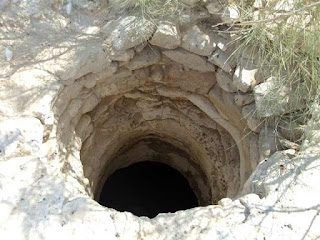 Jesus answered, "I am the way and the truth and the life. No one comes to the Father except through me" (John 14: 6).
Jesus answered, "I am the way and the truth and the life. No one comes to the Father except through me" (John 14: 6).What is your reaction to this verse? It says a lot about where you are relative to Jesus.
Some people might think, "I am so glad that I know Jesus! He is the one who ushers me into a relationship with His Father. And through this relationship, I am ushered into eternal fellowship with both the Father and the Son." Thus, their reaction is one of hope, joy and peace.
Other people might think, "How arrogant of Christians to think that only they are right. This is the height of pride and intolerance." Thus, their reaction is one of indignance, rejection and offense.
These two reactions stand at the heart of the great divide that Jesus Himself provoked while He was here on earth and that continues throughout this age.
"Do not suppose I have come to bring peace to the earth. I did not come to bring peace, but a sword. For I have come to turn 'a man against his father, a daughter against her mother, a daughter-in-law against her mother-in-law--a man's enemies will be the members of his own household'"(Matt. 10: 34-36). In other words, there is a division that is created when Jesus places the option to believe or not to believe in front of people. And even households will be divided by this.
"But I, when I am lifted up from the earth, will draw all men to myself" (John 12: 32).
Jesus was lifted up on the cross as a kind of banner that rallies all of humanity to Himself. Those who look to the cross with eyes of faith are saved. Those who look at the cross, but do not believe, are left in their existing state.
"Just as Moses lifted up the snake in the desert, so the Son of Man must be lifted up, that everyone who believes in him may have eternal life...Whoever believes in him is not condemned, but whoever does not believe stands condemned already because he has not believed in the name of God's one and only Son" (John 3: 14-15, 18).
The "snake in the desert" refers to a story in the book of Numbers. The people were being plagued by snake-bites that were fatal. As a cure, God instructed Moses: "Make a snake and put it up on a pole; anyone who is bitten can look at it and live. So Moses made a bronze snake and put it on a pole. Then when anyone was bitten by a snake and looked at the bronze snake, he lived" (Numbers 21: 8-9). This image of a bronze snake became the symbol of medicine.
To "look at the bronze snake" indicates more than receiving the image of the snake on the back of your retina. When someone was bitten, they needed to believe that looking at the bronze snake held promise of salvation. Implied in looking at the bronze snake is the idea that one was looking with faith in God's provision for their healing.
And the picture of the bronze snake on a pole is a beautiful illustration of Jesus on the cross. He actually "became sin" (2 Cor. 5: 21) for us on the cross. When we look to Jesus by faith, lifted up on a cross, bearing all the weight of sin in Himself for us, we are saved.
When Jesus was crucified, there were two condemned thieves also crucified on each side of him. One of them looked to Jesus and believed He was the Messiah, the Son of God, who was bearing the penalty for sin as He hung there. He placed His faith in Him. And Jesus told him, "I tell you the truth, today you will be with me in paradise" (Luke 23: 43). The other thief mocked Jesus and did not look to him in faith. All of humanity is summarized in these two criminals.
Back to our original question, how do you react to Jesus' claim that He is the only way to the Father? If you are in the "joy" category, it is because you have grasped that it is a question of who Jesus is, not which religion is right. If you are in the "indignant" category, then you see the question as a religious question of who's right.
It all boils down to the person of Jesus, Himself. He is the unique Son of God who came to do for us what only He could do, die for the sins of humanity in order to bring us to God the Father. No other person in all of human history has made such a claim. And because His claim is so radically challenging, it divides all of humanity into two camps: those who look to Him in faith, and those who are offended by His claims.
On what side of the cross do you stand?


